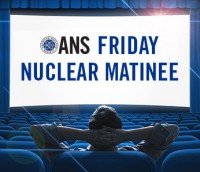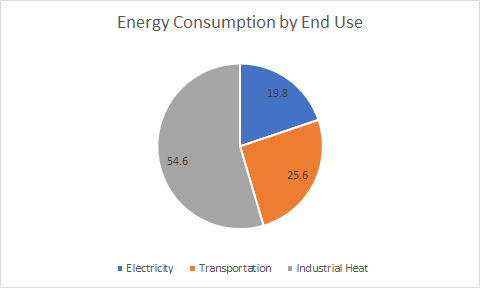Advance Reactors: New Reactors Will Be a Gamechanger
Note from the editor: Our Friday Nuclear Matinee is a day early this week. Please enjoy a short video from Generation Atomic.
Advanced Reactors
 Watch the video: Pollution-Free Energy for the Entire World
Watch the video: Pollution-Free Energy for the Entire World Watch the video: Pollution-Free Energy for the Entire World
Life in the 21st century is better than at any point in history. Today's standard of living in developed nations is higher than that of even the wealthiest of individuals from a mere 200 years ago. Despite the great wealth of many nations, the world still faces great challenges such as climate change and access to basic and advanced resources in the developing world. Industrial processes and burning of fossil fuels have made modern living possible, but now they pose a threat to our very lifestyle. What if there was a reliable way to power modern industrial processes without contributing to climate change? What if there was a way to improve access to resources essential to human needs and promote peace? There is: advanced nuclear reactors.
The 21st century lifestyle has been made possible by abundant energy access. Access to energy and economic well-being are so inextricably linked that the relationship has given rise to the phrase "energy poverty." Global energy access is forecasted by the Energy Information Administration to increase by 41% in the next 30 years, mostly in the developing world due to their relative energy poverty and population growth. To fight climate change while continuing to increase prosperity across the world, radically different energy systems must be deployed than those currently operating in the world. Fossil fuels currently make up a vast majority of global energy, and they are projected to continue to do so until at least 2050, the last year for which projections are available.
 Figure 1 above: Global Energy Production by Source in 2015, data from Energy Information Administration, liquids include crude oil, gasoline, diesel,and other liquid fossil fuels
Figure 1 above: Global Energy Production by Source in 2015, data from Energy Information Administration, liquids include crude oil, gasoline, diesel,and other liquid fossil fuels
 Figure 2 above: Projected Global Energy Production by Source in 2050, projections by the US Energy Information Administration
Figure 2 above: Projected Global Energy Production by Source in 2050, projections by the US Energy Information Administration
Of the global energy consumption, less than half is electricity. A majority of energy consumption is heat used for industrial processes, and about a quarter is used for transportation, so to avoid climate change, these other energy sources must be decarbonized.
 Figure 3 above: Electricity is shown to be less than one-fifth of total energy use globally. Data from the Energy Information Administration
Figure 3 above: Electricity is shown to be less than one-fifth of total energy use globally. Data from the Energy Information Administration
Advanced nuclear reactor technology is uniquely suited to meet this vast decarbonization need. Advanced nuclear reactors ranging from small modular light-water reactors to large scale high-temperature gas-cooled reactors have the capability to provide for all global energy demands. With coolant temperatures ranging from 545ºF to about 1832ºF, advanced reactors can provide heat for processes beyond electricity generation, such as hydrogen production, oil refinement, and steel manufacturing reducing transportation and industrial carbon emissions in addition to providing carbon-free electricity.
Nuclear reactor technology provides benefits far beyond electricity. Reactors produce nuclides such as Technetium-99 which are invaluable to in medical testing. Production facilities for medical nuclides are extremely limited, but deployment of advanced reactors around the globe will drastically increase production possibilities for such medical nuclides. The heat output from reactors can be used to eliminate water scarcity by desalinating ocean water for irrigation and human consumption. Among the various industrial processes that advanced reactors can heat is ammonia production for fertilizer to increase arable land and make vertical farming more accessible.
Deployment of Generation IV reactors promotes peace. Advanced reactors, especially fast breeders, can run on recycled nuclear weapons material, eliminating the most dangerous weapons of mass destruction humanity has ever seen while alleviating energy poverty. Advanced reactors can run on more than just recycled weapons; they can also be fueled with used nuclear fuel that is today considered waste, alleviating one of the largest concerns with existing nuclear power.
Advanced nuclear reactors will drastically change the landscape of nuclear energy by introducing radically different reactors. Ranging from NuScale Power's small modular reactor -- a simplified, smaller version of today's light water reactors which are well under way in the American licensing process. Similar in size but radically different in composition from NuScale's reactor is Terrestrial Energy's integral molten salt reactor which is advancing through Canadian licensing process. Among the most innovative of next generation reactors is the traveling wave reactor, designed by TerraPower, a company founded by none other than Bill Gates. The traveling wave reactor has the ability to operate using natural uranium or even to recycle used nuclear fuel or weapons-grade material. The reactors of the future, which are not that far off -- coming to market within the next ten years, will be drastically different from today's nuclear reactor fleet.
New nuclear reactors will change everything. Stopping climate change, fighting diseases, alleviating poverty, and promoting peace are only a few of the benefits next-generation nuclear reactors have to offer.
REFERENCES:
1 Nye, John V.C. "Standards of Living and Modern Economic Growth." Standards of Living and Modern Economic Growth: The Concise Encyclopedia of Economics | Library of Economics and Liberty, The Concise Encyclopedia of Economics, 2008, www.econlib.org/library/Enc/StandardsofLivingandModernEconomicGrowth.html.
2 "International Energy Outlook 2017." United States Energy Information Administration, 14 Sept. 2017.
3 "Energy Production by Source 2015-2017." Energy Information Administration, 14 Sept. 2017.
4 U.S. Energy Information Administration - EIA - Independent Statistics and Analysis."Petroleum & Other Liquids - U.S. Energy Information Administration (EIA), United States Energy Information Administration, www.eia.gov/petroleum
5 "Energy Production by Source 2015-2017." Energy Information Administration, 14 Sept. 2017.
6 "Energy Consumption by Use." United States Energy Information Administration, 14 Sept. 2017.
7 United States, Congress, Idaho National Labs, et al. "Nuclear Renewable Hybrid Energy Systems: 2016 Technology Development Program Plan." Nuclear Renewable Hybrid Energy Systems: 2016 Technology Development Program Plan.
8 IAEA. NuScale Power Modular and Scalable Reactor. no. July 2013, 2013, https://aris.iaea.org/PDF/NuScale.pdf
9 Application Review Schedule for the NuScale Design. 2017, p. 2017.
10 ---. Status Report - IMSR-400. 2016, https://aris.iaea.org/PDF/IMSR400.pdf
11 Yurman, Dan (The Energy Collective). New Milestones Achieved for SMR Development. 2015, pp. 1-8.
12 Terrapower, Twr-p. (TerraPower, U.S.A.). 2018, pp. 29-30.
Feel free to leave a constructive remark or question for the author in the comment section below.

